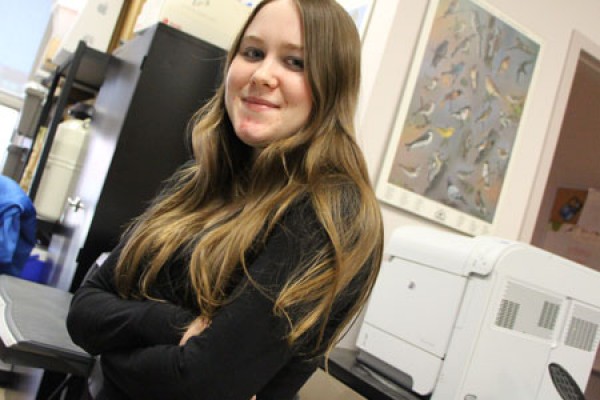 Rachel Hasson won a best oral presentation award at Ontario Biology Day for her research on the relationship between temperature and the spring arrival dates of migratory birds.
Rachel Hasson won a best oral presentation award at Ontario Biology Day for her research on the relationship between temperature and the spring arrival dates of migratory birds.
Based on the award-winning research of a fourth-year biology student, it should be a safe bet that most migratory birds will be a little late this spring getting back to the area from down south.
After analyzing 18 years of bird banding data, Rachel Hasson discovered that nine varieties of song birds, ranging from orioles to warblers, were arriving back to southern Ontario anywhere from three to eight days early, depending on the change in temperature in any given year.
“There was a lot of variety in how much they shifted their arrival dates,” said Hasson, whose work won her a best oral presentation award at Ontario Biology Day, held recently at the University of Toronto’s Mississauga campus. “But basically they arrived earlier when temperatures were warmer, and later when it was colder.”

Hasson, who grew up in Belle River, started volunteering in Oliver Love’s biology lab last year, working with graduate students Christine Madliger and Chris Harris. The bird banding data, obtained from Ruthven Park near Cayuga, Ontario, eventually formed the basis of her undergraduate thesis project.
“We just wanted to know if birds are changing their migratory patterns as a result of changes in temperature,” said Hasson, who is in a concurrent biology and education program, and will enter the faculty of education this fall – although she hasn’t ruled out coming back for graduate school after completing that degree.
Figuring out how birds instinctively know to adjust their arrival dates based on temperature is still something she’s intrigued by.
“That’s not something we were able to test, but it could be a whole number of reasons,” she said. “But it could have implications on their ability to properly raise their offspring.”
Competing in the conference against about 180 students from all across the province – including 20 from Windsor – was an “awesome” experience, she said.
“It was so much fun,” she said. “We were very well prepared and all of the students showcased their research very well. I was glad that I was able to bring this award back to Windsor.”
Dr. Love said he couldn’t be happier for his student.
“It’s amazing,” he said. “Given how many students were there and the calibre of the work, this is a huge accolade for Rachel and our department. The competition is very fierce, so we’re really proud of her.”
